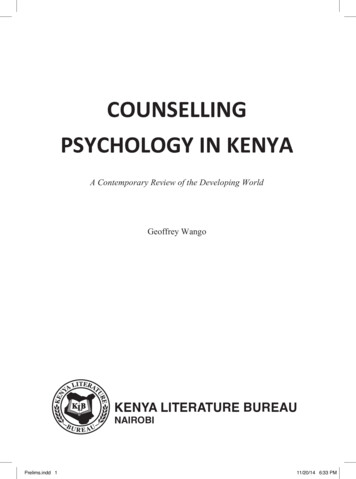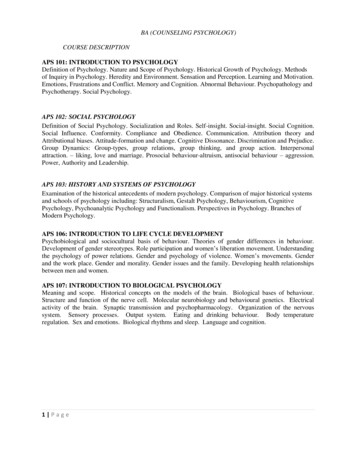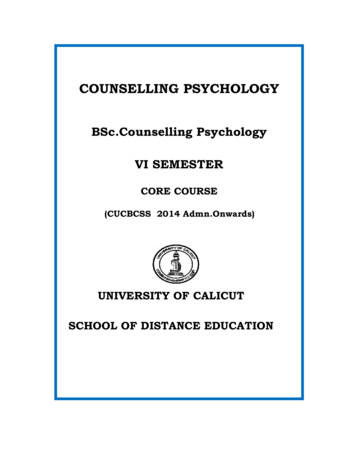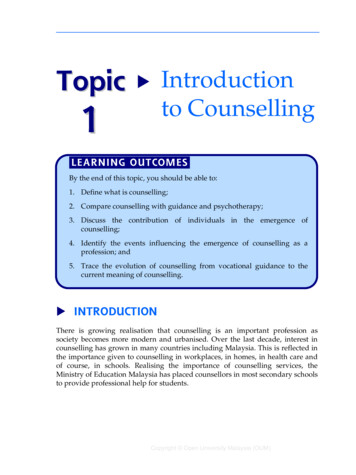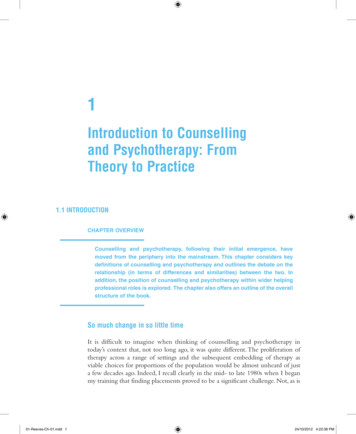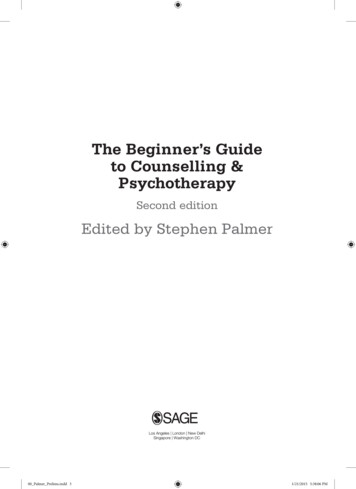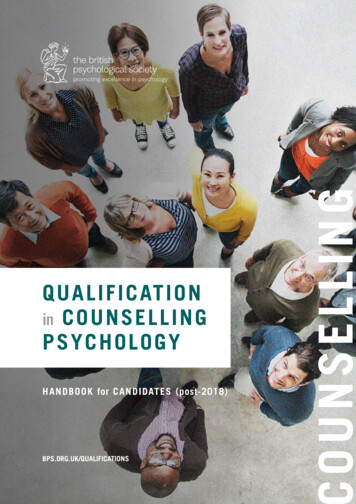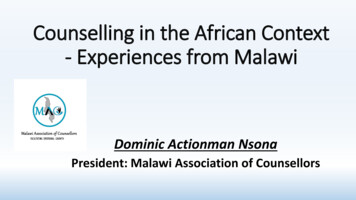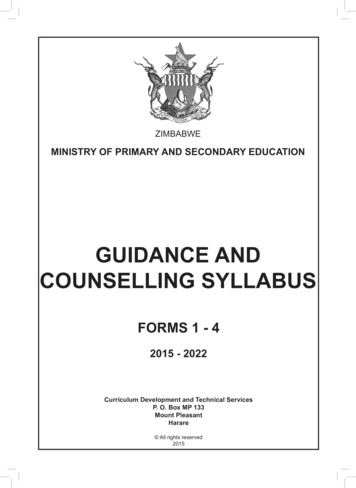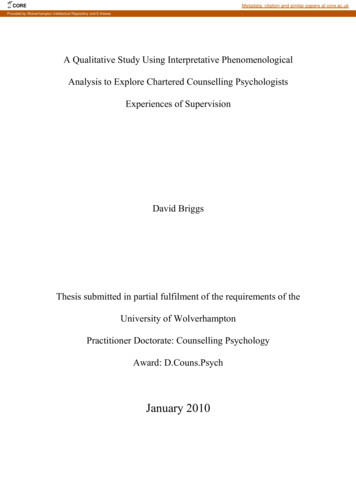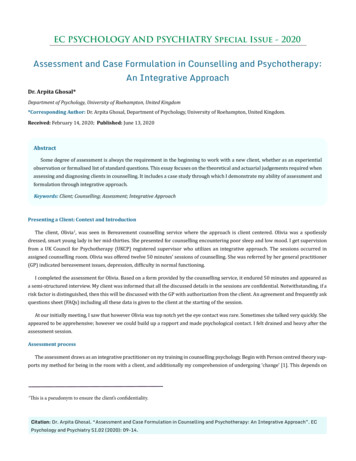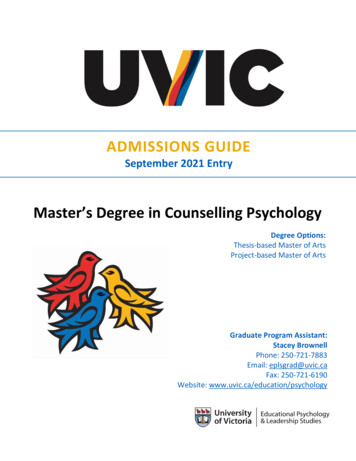
Transcription
ADMISSIONS GUIDESeptember 2021 EntryMaster’s Degree in Counselling PsychologyDegree Options:Thesis-based Master of ArtsProject-based Master of ArtsGraduate Program Assistant:Stacey BrownellPhone: 250-721-7883Email: eplsgrad@uvic.caFax: 250-721-6190Website: www.uvic.ca/education/psychology
Counselling Psychology Admissions GuideSeptember 2021 EntryTABLE OF CONTENTSCounselling Psychology Admissions Guide . 3Application Process . 3Admissions Requirements and Guidelines . 41.Baccalaureate degree . 42.Prerequisite courses . 43.Counselling-related hours: resumé and field experience charts . 54.Counselling skills evaluations (2 only) . 65.Assessment reports (2 only) . 66.Personal statement. 67.Research statement (for thesis-based applicants only) . 78.English proficiency (for applicants whose first language is not English only) . 79.Re-applying . 7Criminal Record Check . 7Application Checklist . 8Field Experience Chart . 9List of Required Prerequisite Courses . 10Example Counselling Skills Evaluation . 11ED-D Course Equivalencies Guide . 13ED-D 414 Group Processes. 13ED-D 417 Skills for Effective Interpersonal Communication . 13ED-D 418 Introduction to Theories of Counselling . 15University of Victoria Psychology Examples . 16We acknowledge and respect the Lkwungen-speaking peoples on whose unceded traditional territorythe university stands and the Songhees, Esquimalt and WSÁNEĆ peoples whose historical relationshipswith the land continue to this day.2
COUNSELLING PSYCHOLOGY ADMISSIONS GUIDEPlease note that the application process and requirements in this admissions guide are for theSeptember 2021 on-campus program.All program requirements are posted on our website chology.If you are interested in the Indigenous Communities Counselling Psychology (ICCP) Program, pleasevisit ology/indigenous-communities todownload the ICCP admissions guide.APPLICATION PROCESSAPPLICATIONS ARE DUE DECEMBER 1, 2020.Applicants are encouraged to begin the online application process early (2-3 months before thedeadline), as there is often a delay in obtaining the necessary supporting documents (e.g., references,transcripts). Make sure you are aware of all the admissions requirements (page 4).Submit your application online at www.uvic.ca/application. Fill out the application clearly andcompletely. Upload required documents (PDF format) with your application. You must includeinformation for all post-secondary institutions at which you registered for courses. Failure todisclose previous studies may result in your admission and registration being cancelled.Include the application fee with your application - you must pay online with a credit card.Application fees are listed at e the application checklist (page 8) to ensure all documents are uploaded or sent to theproper place. Failure to do so may result in an incomplete application and may jeopardize theapplication. Original documents must be received by the dates indicated.Fillable PDF forms (counselling skills evaluation, list of prerequisite courses, field experiencechart) are available at ology/admissions.Counselling skills evaluations (CSEs) will be kept on file in the Department of EducationalPsychology and Leadership Studies for seven years.For assistance with the department admissions policy and procedures contact:Stacey Brownell, eplsgrad@uvic.ca, 250-721-7883For assistance with the Graduate Admissions & Records policy and procedures contact:Jeremy Bubiak, grad7@uvic.ca, 250-721-7974Counselling Graduate Advisor:counsadv@uvic.ca3
ADMISSIONS REQUIREMENTS AND GUIDELINESApplicants who have complete applications will be given priority over those applicants who haverequirements still in progress. However, due to the competitive nature of the application process, acomplete application may or may not be competitive in comparison to other applications in any givenyear. Meeting the minimum requirements does not guarantee entry to the program.Offers of admission are for a particular program start date and cannot be deferred. Applicantsdeclining an offer of admission must re-apply.1. Baccalaureate degreeWe require that you have completed a four-year baccalaureate degree (or equivalent degree fromanother country) from a recognized institution. Your degree may be in any discipline. Submitunofficial transcripts for ALL post-secondary institutions at which you registered for courses.All applicants must have earned the equivalent of a B average over the last two years (or equivalentof 30.0 UVic units) of their degree, in order for their application to be processed. Non-graded (passfail) courses, credit granted on the basis of life or work experience, or credit earned at institutions notrecognized by the university will not be used in determining an applicant's grade point average orunits completed. More info on GPA calculation is available on the Graduate Studies issions/beforeapplying/requirements.If you are pursuing the thesis-based program, completing an undergraduate thesis (honours level) isnot required, but it will make your application more competitive.2. Prerequisite coursesApplicants must fill out the list of required prerequisites courses with the following courses orapproved equivalents: ED-D 414 Group Processes* with a B or higher ED-D 417 Skills for Effective Interpersonal Communication* with a B or higher ED-D 418 Introduction to Theories of Counselling* with a B or higher An upper level course in the area of developmental psychology An upper level course in the area of abnormal psychology/behavioural disorders An upper level statistics course (for thesis-based applicants only)*All three ED-D courses must have been completed within seven years of the application deadline. EDD 417 and ED-D 418 MUST be completed by December 31 of the year prior to program start.If you have not completed ED-D 417 or ED-D 418 by December 31, or if you obtain a B or lower inany of the three ED-D courses, your application will not be processed. Your application will be morecompetitive if you also have the upper level psychology courses, and statistics for thesis-basedapplicants, completed by December 31. Knowing ED-D 414 is hard to find outside of UVic, you canapply without it and it won’t make your application any less competitive. If you are offered a spot inthe program, then you will be required to take ED-D 414 at UVic in the August before the programstarts.The ED-D equivalencies guide (p. 11) explains the criteria a course must meet in order to be acceptedas equivalent to one of the ED-D courses. If your course meets these minimum criteria, you may4
submit an equivalency request to be evaluated. To do so, please send an email to counsadv@uvic.cabefore the application deadline. Make sure to state which prerequisite you are requestingequivalency for. You may request equivalency for courses before or after the courses have beentaken. In both instances, copies of the full course syllabus for the exact term and instructor must besubmitted. The UVic psychology examples chart (p. 16) provides examples of acceptable psychologycourses.Please note: Because we consider work experience as one of our main criteria for adjudication, we donot accept work experience or practica to substitute for prerequisite courses or any otherrequirement.3. Counselling-related hours: resumé and field experience chartsCounselling related experience is defined as working 1 with “vulnerable populations” 2 in a positionwhere the applicant’s main role was to help individuals or groups with personally meaningful goals orneeds. Such experience should involve person-to-person and/or group helping relationships in which(a) you play a facilitative role in learning, personal and emotional growth, and/or psychologicaldevelopment and (b) are required to demonstrate professional and ethical behaviours, effectiveinterpersonal skills and personal awareness. It must also include supervision involving evaluativefeedback from a professional of a higher administrative position (i.e., not peer consultation) withclearly stated roles and responsibilities for the individual and the supervisor. This requirement can bemet through volunteer work experience, although preference may be given to you if you havesustained relevant, paid work experience.Counselling related examples include social worker, peer helping, group facilitator, teaching, specialneeds care, group homes, at-risk youth outreach, volunteer counselling, distress line work, bigbrother/sister and lay counselling programs.If your job involved some hours of direct work with clients and some hours of administrative tasks,case management, training, or other tasks not eligible as counselling hours, you can differentiatebetween “Total # of hours worked on the job” and “# of hours of direct helping experience” on thefield experience chart.For every counselling-related position held, fill out a field experience chart (page 9). Fillable cs/Field-Experience-Chart.pdfIn the resumé, please document all work experience and include a brief statement about what wasgained or learned from each experience. Whether the candidate was working or not, all gaps in thehistory should be included and explained. The purpose of the experience requirement is, in part, toshow involvement and interest in people-oriented work. Please include on the first page: currentdate, name, address, phone number and email address.Volunteer and/or paid work experience.While it is arguable that the human condition renders us all vulnerable, by vulnerable populations we refer topersons/populations more vulnerable than typical adult-aged persons of the general population. Children and youth are avulnerable population (which is why volunteers and service personnel require criminal record checks).125
4. Counselling skills evaluations (2 only)The purpose of these evaluations is to provide a detailed qualitative assessment of your counsellingskills and professional characteristics.All applicants must get two counselling skills evaluations (CSEs) filled in. One must be from yourinstructor of ED-D 417 or pre-approved equivalent course. The other should be from a supervisorfrom a counselling-related setting. These two referees should be different from the two referees whofill in your assessment reports.Applicants must send the blank CSE to their referees. Each referee will email the completed CSEdirectly to the Educational Psychology and Leadership Studies Graduate Programs Office(eplsgrad@uvic.ca). An example of the CSE is available on page 11. Fillable ounsellingSkillsEvalForm.pdf.Applicants must indicate on their personal statement who has been asked to submit theseevaluations.5. Assessment reports (2 only)Assessment reports are required from two academic or professional references. The counsellingadmissions committee would prefer to see at least one academic reference. The second may be aprofessional reference or another academic reference who is familiar with your work.These two referees should be different from the two referees who fill in your counselling skillsevaluations. The names and email addresses of your chosen assessors are required as part of youronline application. UVic will send the assessment report link directly to your referees upon submissionof your application. It is important that you contact your referees prior to providing them here inorder to confirm their willingness to provide you with an assessment. A letter of reference may alsobe supplied as part of the assessment report.You may log in your application and return to the assessment section to review the status of yourassessment reports as they are completed by your referees, make changes to your refereeinformation, or resend an assessment request if necessary.6. Personal statementApplicants must prepare a personal statement (maximum five pages) covering the following areas: How might enrolment in a counselling graduate program at the University of Victoria help youmeet important life goals and aspirations? Are there any critical incidents in your life thathelped you to develop these goals and aspirations?What preferences do you have in a counselling graduate program in terms of course contentand style of teaching, skill development and personal learning?What are your strengths and weaknesses as a person, learner and counsellor?What personal values are most important to you and how do they influence your views aboutbeing a counsellor?What type of setting would you like to work in following graduation from a counsellingprogram and what client population would you like to work with?6
Add any other relevant information that you think would help the admissions committee toknow about you as a person and a potential counsellor.Indicate the names of the people who have been asked to submit your two counselling skillsevaluations.Please include on the first page: current date, name, address, phone number and email.Applicants are advised to use the above headings in abbreviated form to facilitate the reading ofmaterial. The personal statement needs to be typed, double spaced, with normal margins and nolonger than five pages.7. Research statement (for thesis-based applicants only)The research statement must include a description of previous experience with research projects orcourses, as well as a brief description of present interests in counselling research areas. It needs to betyped, double spaced, with normal margins and no longer than two pages. On the first page, pleaseinclude the current date, name, address, phone number and email address.Please note: The number of thesis-based students admitted each year varies, dependent upon theavailability of faculty members for supervision. Thesis-based applicants will be selected based onavailability of supervisors and on the match between applicant research interests and faculty interestand/or background in that particular area.8. English proficiency (for applicants whose first language is not English only)If your first language is not English, and you have not resided in a designated English-speaking countryfor three years immediately prior to the entry-point applied for, you must provide proof of EnglishLanguage proficiency. This can be done by providing results directly to the University from a TOEFL,IELTS or MELAB test. Official test score reports must be sent directly to the University of Victoria bythe testing agency. Scores older than two years are not acceptable.Please note: Given that the counselling profession requires an excellent command of the Englishlanguage including emotion-based vocabulary and subtle understanding of nuanced communications,minimum scores for University of Victoria admissions are not sufficient for entrance to the counsellingpsychology program. Visit the following site for details on required sources/english-proficiency9. Re-applyingAn in-depth letter must be submitted showing the actions taken to strengthen the new applicationover the previous one. The letter of re-application must be typed, double spaced, with normalmargins and should be no longer than two pages.Updated documents are also required to reflect the actions taken to strengthen the application (i.e.,field experience chart(s), resumé, new transcript).Criminal Record CheckAll applicants that are admitted will be required to undergo a Criminal Record Check (Solicitor GeneralCRC only) in compliance with the BC Criminal Records Review Act. Full admittance to the programrequires a successful criminal record check. Await department instructions before proceeding.7
APPLICATION CHECKLISTShould be received prior to application at counsadv@uvic.ca: Request for course equivalency (if appropriate)Apply online at www.uvic.ca/application by application deadline (December 1, 2020).Upload the following documents with your application, in PDF format:List of required counselling prerequisite coursesPersonal statementField experience chart(s)ResuméUnofficial transcript(s)* including UVic transcriptsThesis-based applicants only: Research statementFor applicants who are re-applying: a letter stating actions taken to strengthen the newapplication and any updated documents Unofficial English proficiency test scores The application fee must be paid online by the application deadline. *If you are taking courses (Sept-Dec) at time of application, please make sure you upload yourupdated transcripts to your online application after your marks are in for the term.Must be received directly from the referee to eplsgrad@uvic.ca no later than January 1, 2021: Counselling skills evaluation #1 from ED-D 417 instructor or equivalent Counselling skills evaluation #2Must be received electronically by Graduate Admissions and Records from the referee no later thanJanuary 1, 2021: Assessment report #1 Assessment report #2Due January 1, 2021. Sent to Graduate Admissions and Records directly from testing body: For international applicants only: official English language proficiency test scores (TOEFL, IELTS,or MELAB)If offered admission, mail official final transcript(s) to Graduate Admissions and Records:Graduate Admissions and RecordsUniversity of VictoriaPO Box 3025 STN CSCVictoria BC V8W 3P2 Canada Copy of your official transcript(s)Please note: You do not need to mail in official transcripts for courses taken at UVic8
FIELD EXPERIENCE CHARTApplicant Name:Position title:Start date:End date:Organizationname:Setting (i.e.school, clinic):Address:SupervisorInformation:*Name:Tel. #:Email:Number ofhours:Total # of hours worked on the job:# of hours of direct helping experience:Responsibilitiesand duties:Skills Required:*Please note that the supervisors may be contacted to verify direct contact hours noted and/or otherrelevant information about the position.The above information is true and accurate, to the best of my knowledge:Applicant Signature9Date
LIST OF REQUIRED PREREQUISITE COURSESIf you are in progress or planning to take the course in the future, please indicate this in the table.For psychology or statistics courses where the title of the course does not present a clear meaningof the course content, and for all ED-D equivalent courses, please email a course syllabus tocounsadv@uvic.ca prior to application.Applicant Name:Date:ED-D 414: Group Processes or equivalentCourse Name & NumberWhere & WhenGradeED-D 417: Skills for Effective Interpersonal Communication or equivalentCourse Name & NumberWhere & WhenGradeED-D 418: Introduction to Theories of Counselling or equivalentCourse Name & NumberWhere & WhenGradeUpper level development psychology courseCourse Name & NumberWhere & WhenGradeUpper level abnormal psychology/behaviour disorders courseCourse Name & NumberWhere & WhenGradeThesis-based applicants only: Upper level statistics courseCourse Name & NumberWhere & WhenGrade10
EXAMPLE COUNSELLING SKILLS EVALUATIONPlease send your referees the fillable version of this CounsellingSkillsEvalForm.pdfTo the Referee: This form is meant to be completed by a counselling course (ED-D 417 or equivalent) instructor or acounselling (or a related profession) supervisor in a volunteer or professional setting. Additional information may beprovided in a letter but REFEREES MUST COMPLETE THIS FORM IN FULL. The information in this report will beconsidered confidential and will not be released to the applicant or anyone outside the University of Victoria.Name of ApplicantDate of Report:Location of Supervisory or Teaching Relationship:Context of Relationship: Course (number/title,grade, duration, content) Clinical Setting (volunteer/paid, duties performed,duration)Dates and duration of contact:Type and amount of supervision per client hour: Ability to establish rapport with clients:Inability toeffectivelyestablishrapportStruggles toeffectivelyestablishrapportAble toeffectivelyestablishrapportVery skilledin effectivelyestablishingrapportExceptionally skilledin effectivelyestablishingrapport Ability to demonstrate active listening skills (i.e. paraphrasing, summarizing, clarification, andappropriate questioning) with clients:Inability todemonstrateactivelisteningskillsStruggles todemonstrateactivelisteningskillsAble todemonstrateactivelisteningskillsVery skilledin demonstratingactivelisteningExceptionally skilledin demonstratingactivelistening Ability to demonstrate accurate expressed empathy with clients:Inability todemonstrateaccurateexpressedempathyStruggles todemonstrateaccurateexpressedempathyAble todemonstrateaccurateexpressedempathyVery skilledin demonstratingaccurateexpressedempathyExceptionally skilledin demonstratingaccurateexpressedempathy Ability to demonstrate conceptual skills (e.g. case conceptualization, treatment planning) insupervision and case consultation:Inability todemonstrateconceptualskillsStruggles todemonstrateconceptualskillsAble todemonstrateconceptualskillsVery skilledin demonstratingconceptualabilities11Exceptionally skilledin demonstratingconceptualabilities
Demonstration of professional/ethical behaviours (as defined by the Canadian CounsellingAssociation) with colleagues and clients:Did led icient basisto judge applicant’sprofessional/ethicalbehaviours Demonstrates openness to feedback from supervisors:Was notopen tofeedback fromsupervisorsSomewhatopen tofeedback fromsupervisorsFairlyopen tofeedback fromsupervisorsVery opento feedbackfrom supervisorsCompletely opento feedbackfrom supervisors Applicant’s ability to demonstrate awareness of the impact of his/her behaviour on others (i.e.,clients, colleagues, supervisors, staff):Inability todemonstrateawareness ofimpact onothersStruggled todemonstrateawareness ofimpact onothersAble todemonstrateawareness ofimpact onothersClearlydemonstratesawareness ofimpact onothersInsufficient basisto judge applicant’sawareness What is your overall assessment of the suitability of this applicant for entrance into the graduateprogram in counselling psychology?The candidateis unsuitableThe candidateis belowaverageThe candidateis averageThe candidateis very goodThe candidateis excellentThe candidateis exceptionalPlease use this section to provide further comments on the applicant:Evaluator’s Information: Name: (Please print)Signature:Title:Phone:Email:Please email this form directly to the Counselling Graduate Secretary at eplsgrad@uvic.ca12
ED-D COURSE EQUIVALENCIES GUIDERevised April 2020We have developed this guide and list of possible courses to assist you in identifying equivalentcourses for the prerequisites ED-D 414, ED-D 417 and ED-D 418.However, these are subject to change and do not guarantee equivalency – a specific course syllabusmust be reviewed by the Graduate Advisor for each course, even it is listed here, since courses canbe taught differently from year to year. The final decision about course equivalencies will be made bythe Graduate Advisor prior to the Admissions Committee’s adjudication of applications to theprogram.To request equivalency for courses listed below AND for courses not yet listed, please send an emailto counsadv@uvic.ca before the application deadline. Make sure to state which prerequisite you arerequesting equivalency for. You may request equivalency for a course before or after the course hasbeen taken. In both instances, copies of the full course syllabus for the exact term and instructor mustbe submitted (including the course title and unit value, name of course text(s), information onrequired assignments and grading, etc.).Before submitting a request for equivalency, applicants should consider the equivalency criteria laidout below for each course.Please note: ED-D 414, ED-D 417 and ED-D 418 must have been completed within seven years of theapplication deadline or they will need to be repeated.ED-D 414 Group ProcessesUVic calendar description: Analysis, theory, and research related to group processes, decision-making,and leadership in a variety of settings. Awareness and understanding of self in group contexts.Includes skills practice and development related to group membership and facilitation.This course is offered on campus each term (September, January and August).While ED-D 414 is a difficult course to find at other universities, we want students to have anunderstanding of basic group dynamics and processes before entering the program. If you have acourse that covers these basic elements of groups, then we will likely consider the course equivalent.Courses such as Social Psychology that focus on more “macro-level” groups (e.g., high socioeconomicgroups, minority groups, marginalized groups) are not considered equivalent.InstitutionUniversity of AlbertaUniversity of CalgaryDouglas CollegeU. of the Fraser ValleyKwantlen Polytechnic U.Laurentian UniversityCourse #PSYCO 405SOWK 395CYCC 4468SOWK 301CNPS 4330SWRK 3727ELTitle(s)Group Processes and Intergroup RelationsPractice and Evaluation with GroupsAdvanced Skills with Groups in CYC OrganizationsSocial Work Practice with GroupsGroup FacilitationSocial Work with GroupsUniversity of ManitobaMacEwan UniversityEDUA 5540CYCW 204Groups in GuidanceGroup Work(was 4437EL)13Continued on next page
McGill UniversityMount Royal UniversityUniversity of ReginaVancouver IslandUniversityUniversity of VictoriaEDPC 502SWRK 321 (was 376A)CYCC 2216SW 425CYC 265CYC 475 (was 465)CYC 475Group Processes and IndividualsSocial Work Practice with GroupsGroup Processes and Counselling TheoryGroup WorkIntro to Group Work Practice in Professional CYCAdvanced Activity based CYC Practice in GroupsAdvanced CYC Practice with Groups and FamiliesED-D 417 Skills for Effective Interpersonal CommunicationUVic calendar description: Basic interpersonal communication skills for active listening, empathicunderstanding and communication of empathy. Includes analysis of effective interpersonal skills andskill building laboratory experience. The content and skills are transferable to a variety of settings,including counselling, education, human development, management, healthcare, psychology andrecreation.This course is offered on campus each term (September, January and May).ED-D 417 is designed specifically to develop basic communication skills for counselling with a focus onactive listening, basic and advanced empathy and goal setting. Course assignments are designed toassess the level of skill development in students with a final grade that is primarily (at least 70% of thegrade) based on demonstrated skills. Students in the course are required to engage in twohours/week outside of class in simulated counselling sessions (i.e., 1 hour as a “client” and 1 hour as a“counsellor”). If you are thinking of requesting equivalency, here are a couple of things to consider:1) Does my course have at least 70% of my final grade comprised of actual skills assessment?2) Is my course designed to not only teach the concepts of basic counselling skills but also to train meto develop those skills through regular practice?Meeting these two requirements does not guarantee that your course will be considered equivalent.However, if your course does not at least meet both of criteria, then it will not be consideredequivalent to ED-D 417.InstitutionUniversity of BCUniversity of CalgaryDouglas CollegeU. of the Fraser ValleyKw
Counselling Psychology Admissions Guide . Fillable PDF forms (counselling skills evaluation, list of prerequisite courses, field exp erience . ED-D 418 Introduction to Theories of Counsellin
